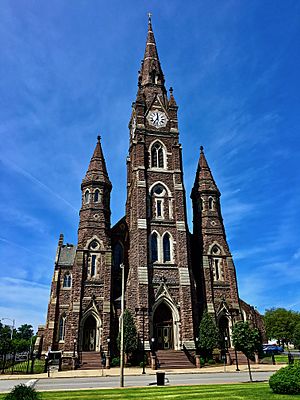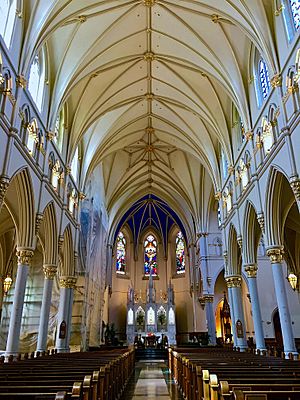St. Peter Cathedral (Erie, Pennsylvania) facts for kids
Quick facts for kids Saint Peter Cathedral |
|
|---|---|
 |
|
| 42°7′27″N 80°5′13″W / 42.12417°N 80.08694°W | |
| Location | 230 West 10th Street Erie, Pennsylvania |
| Country | United States |
| Denomination | Roman Catholic |
| History | |
| Status | Cathedral |
| Founded | February 1873 |
| Dedication | Saint Peter |
| Dedicated | August 2, 1893 |
| Consecrated | May 17, 1911 |
| Architecture | |
| Functional status | Active |
| Architect(s) | Patrick Keely |
| Style | Gothic Revival |
| Groundbreaking | August 1, 1875 |
| Construction cost | $274,000 |
| Specifications | |
| Length | 220 ft (67 m) |
| Width | 112 ft (34 m) |
| Number of spires | 3 |
| Spire height | 265 ft (81 m) Central 150 ft (46 m) Side |
| Materials | Sandstone |
| Bells | 12 |
| Tenor bell weight | 4,500 lb (2,040 kg) |
| Administration | |
| Diocese | Erie |
| Province | Philadelphia |
St. Peter Cathedral is a beautiful Roman Catholic church located in Erie, Pennsylvania. It stands at 230 West 10th Street, right at Sassafras Street. This impressive building is a central part of the Erie community.
Contents
History of the Cathedral
Building a Grand Church
The idea to build St. Peter Cathedral started in 1873. Bishop Tobias Mullen of the Roman Catholic Diocese of Erie began the plans. The first stone, called the cornerstone, was placed in a special ceremony on August 1, 1875. This day is known as St. Peter in Chains Day.
Construction and Completion
Building the cathedral took many years. People from churches all over the diocese helped raise money. Finally, the cathedral was finished in 1893. The main architect, or designer, was Patrick Keely from Brooklyn. He was famous for designing many churches, including 21 cathedrals in the eastern United States.
Exploring the Cathedral's Design
Outside the Cathedral
St. Peter Cathedral is built in a style called Gothic Revival. This means it looks like older Gothic churches from France, but it was built more recently. Much of the stone for the foundation came from old locks of the Erie Extension Canal. This canal closed in 1871. The outside walls are made of red sandstone from Medina, New York. White sandstone from Amherst, Ohio, and Mercer County, Pennsylvania, was used for the trim.
Towers and Bells
The cathedral has three tall towers. The central bell tower reaches 265 feet (about 81 meters) high. On each side, there are two Norman style towers, each 150 feet (about 46 meters) tall. The main bell tower holds a chime of twelve bells. These bells weigh 14 tons and were made in 1903. The E. Howard Clock Company installed the clock in the tower in the same year.
Stained Glass Windows
The cathedral is famous for its amazing stained glass windows. The windows in the main worship area, called the sanctuary, and the side sections, called the transept, were made in Munich, Germany. They show important Bible stories like the Annunciation (when an angel told Mary she would have Jesus) and the Birth of Jesus. Other windows show the Crucifixion, the Resurrection, and the Ascension. Large side windows show the Conferral of Keys to Saint Peter and Jesus' supper at the house of the Publican. There are also windows showing the Life of St. Peter and four important church teachers. In the early 1990s, all the stained glass was cleaned and reset. New glass prisms were added to help sunlight shine inside.
The Cathedral Organ
The cathedral organ is a very special musical instrument. It was built in 1977 by Casavant Frères in Montreal, Quebec, Canada. This organ can make many different sounds, like French organs. More parts were added to it in 1999. It is the third organ the cathedral has had since it was built.
Inside the Church
As you walk through the main part of the church, called the nave, you can see pictures of the nine bishops of the diocese. You can also see a picture of Auxiliary Bishop Edward Peter McManaman, who was in charge of the cathedral from 1936 to 1948.
The cathedral has a new baptistery, which is where baptisms take place. The main aisle is made of beautiful Spanish and Italian marble. At the front of the church, a large seal of the Diocese of Erie is carved into the marble. It also shows the symbols of Pope Leo XIII, Bishop Mullen, Pope John Paul II, and Bishop Trautman.
The sanctuary area is where the altar is located. Underneath the altar is a special box called a reliquary chest. This area also has the Bishop's special chair, called a cathedra, and the pulpit (also known as an "ambo") where sermons are given. The Blessed Sacrament is kept in a special cabinet called a tabernacle on the north side of the cathedral. An older marble altar from 1911 was used until changes were made in the 1960s.
Cathedral Preparatory School
Right behind the cathedral is an all-boys high school called Cathedral Preparatory School. This is why it has "Cathedral" in its name! When the school first started, classes were held in rooms inside the cathedral. Today, the students still attend weekly mass in the cathedral.
See also
 In Spanish: Catedral de San Pedro (Erie) para niños
In Spanish: Catedral de San Pedro (Erie) para niños
 | Chris Smalls |
 | Fred Hampton |
 | Ralph Abernathy |




